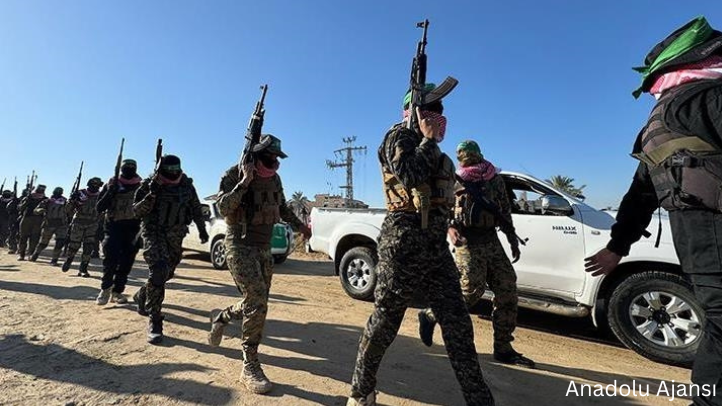Introduction
Hamas’ recent statement, in response to former President Donald Trump’s peace plan, did not directly commit to disarmament as part of ending the war in Gaza. Instead, the group deferred decisions regarding its weapons, emphasizing that broader issues concerning Gaza’s future and the rights of the Palestinian people would be addressed through an “inclusive Palestinian national framework” that includes Hamas. This approach underscores the group’s insistence on negotiating political and strategic matters before agreeing to disarmament.
Hamas’ Position on Disarmament
The statement indicates that Hamas is not prepared to immediately relinquish its weapons. Instead, the group positioned the issue of disarmament within a larger political context:
- Deferred Decision: Hamas postponed any definitive announcement regarding the future of its arms.
- Political and Territorial Context: The group linked disarmament to discussions about Gaza’s governance and Palestinian rights.
- Inclusive Framework: Hamas emphasized that future decisions would occur within a broader, inclusive Palestinian dialogue, ensuring the group remains a participant in shaping policies.
By tying disarmament to these conditions, Hamas communicates that any agreement to surrender weapons must account for broader political outcomes rather than being a standalone concession.
Implications for Peace Negotiations
Hamas’ conditional approach has significant implications for ongoing peace efforts. Negotiators must now consider:
- Timing and Sequencing: Disarmament may need to follow agreements on political representation, governance, and Palestinian rights.
- Complex Diplomacy: Israel and mediators must balance security concerns with the political aspirations of Hamas and the Palestinian population.
- Risk of Delays: Deferring the weapons question could prolong negotiations, requiring continued humanitarian and diplomatic oversight.
This indicates that while progress may occur in areas like hostage release or cease-fire implementation, the long-term question of military capabilities remains unresolved.
Inclusive Palestinian National Framework
Hamas highlighted the importance of an inclusive framework for discussing Gaza’s future and Palestinian rights. Such a framework is intended to:
- Engage Multiple Stakeholders: Incorporate diverse Palestinian voices, including Hamas, to ensure legitimacy.
- Address Political Rights: Discuss governance, civil administration, and representation in Gaza.
- Facilitate Negotiated Solutions: Provide a structured process for resolving complex issues tied to the conflict, including security arrangements.
By positioning future decisions within a collective dialogue, Hamas aims to secure political leverage while demonstrating willingness to participate in structured negotiations.
Strategic Messaging
The statement also serves as strategic messaging from Hamas:
- For Israel: Indicates that disarmament cannot occur unilaterally and will depend on broader political arrangements.
- For International Mediators: Signals the need for continued facilitation and oversight to balance humanitarian, security, and political priorities.
- For Domestic Audience: Reassures Palestinian supporters that Hamas retains influence over key decisions affecting Gaza and broader Palestinian rights.
This communication allows Hamas to remain engaged in international diplomacy while maintaining internal legitimacy.
Potential Challenges
While the inclusive approach provides a platform for negotiation, it also introduces challenges:
- Ambiguity on Disarmament: Israel and other parties lack clarity on when and how weapons will be addressed.
- Extended Negotiations: Inclusive frameworks may lengthen discussions, delaying resolution of immediate humanitarian and security concerns.
- Coordination Among Stakeholders: Aligning multiple Palestinian voices with Israeli and international parties requires careful diplomacy and trust-building.
Successful implementation will depend on ongoing dialogue, verification mechanisms, and strong mediation efforts.
Humanitarian and Security Considerations
Even as Hamas defers the disarmament question, progress in other areas, such as hostage release and cease-fire measures, remains critical. Ensuring safe conditions for civilians, facilitating humanitarian aid, and preventing renewed escalation are essential priorities for Israel, Hamas, and mediators.
This dual focus—addressing immediate humanitarian needs while negotiating long-term political and security arrangements—reflects the complexity of resolving the Gaza conflict.
Conclusion
Hamas’ decision to defer a disarmament announcement emphasizes the centrality of political and territorial considerations in any peace plan. By advocating for an inclusive Palestinian national framework, the group seeks to ensure participation in shaping Gaza’s future while maintaining leverage in negotiations. Mediators, Israel, and international partners must navigate this nuanced position, balancing security imperatives, humanitarian needs, and political realities to achieve sustainable outcomes.
%20(4).png)




